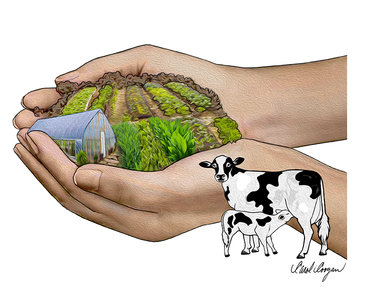Common sense: We hold the future in our hands
The history of humankind is one of change — and change has been rapid in our era.
If we look back to the relatively recent founding of our nation, we will see that the farmer played an essential role. Most of the European settlers who built the United States were farmers. They cleared the land that eventually fed a nation.
If we do the same for, say, newspapers, we can see that they, too, were instrumental in our nation’s founding. From Peter Zenger to Thomas Paine, the words printed in newspapers inspired the revolution that led to our great experiment in democracy.
Who wouldn’t want to support farmers who today, although a much smaller proportion of our population, still feed us all?
Who wouldn’t want to support newspapers, the means by which an informed citizenry makes wise choices?
But we in the news business are well aware of the cataclysmic changes brought by modern technology and modern needs. We believe that generations as recent as our grandparents’ would be shocked or incredulous to learn, if they were still alive, that most people don’t get their news from a printed paper.
If we look forward 100 years instead of back a century, will our progeny in 2122 think it strange that we once learned of world events from words printed on the pulp of dead trees or that we nourished ourselves from the milk of pregnant animals?
Even today, instantaneous communication puts events half a world away, like the war in Ukraine, on a screen in our home or in our hand every minute of every day if we care to see them.
This can make us hyper aware that we are part of the world, a global community.
At the same time, we, as human beings, have progressed to a place we have never been before, to a place where we have endangered our natural world in a way that may be irreparable.
All of these thoughts were swirling in our head as we read an in-depth story our Hilltown reporter, Noah Zweifel, wrote this week on a local assemblyman’s proposal to reintroduce whole milk into New York State public schools.
The story started with a simple premise: Republican Chris Tague held a press conference where a school leader said she grew up drinking whole milk. “But I don’t drink skim milk,” she said, lamenting that is all that school cafeterias serve. “I don’t like it,” she said.
Todd Heyn, a manager at the New York farm Bureau, told Zweifel that Tague’s bill would “support New York’s dairy farmers, who are facing a number of economic challenges right now, including higher labor costs, rising energy prices, inflation, and regulatory pressures.”
Who wouldn’t want to help the farmers?
But let’s look at the larger picture — the global one of which we are a part.
The United Nations Food and Agriculture Organization said in 2009 that the world’s population would grow by a third — 2.3 billion people — by 2050. The organization said that means, in the same time period, food production has to about double.
Remember: 2050 is less than 30 years away — no doubt within the lifetime of many of our readers.
The key is to balance human nutritional needs with the toll that raising livestock has on the environment. People, such as the school superintendent, who like the taste of whole milk want to get kids hooked on whole milk too. That, of course, would support an industry that is central to the state, dairy being New York’s leading agricultural product.
But it’s not what the United States Department of Agriculture has decided is healthiest for Americans. Rather, we should eat foods rich in unsaturated fats and low in saturated fats like whole milk.
Currently, the USDA says that only 2 percent of Americans get the three cups of dairy products needed each day. This supplies protein, energy, and calcium as well as a slew of needed vitamins.
Less than a quarter of Americans are eating at or under the recommended limit of saturated fat, which is linked to heart disease. This, too, has economic repercussions as obesity costs New York State over $12 billion annually in health-care expenses, according to the state’s comptroller.
Brains and bodies develop best if kids eat healthy foods. And children form habits that last a lifetime. That is the central thrust of Tague’s bill — getting children to want to drink whole milk for the rest of their lives.
A decade ago, we wrote on this page in favor of the Obama Administration’s 2010 Hunger-Free Kids Act, which went into effect in 2012, giving the USDA the authority to set new standards for food sold in school lunches and vending machines.
Some districts complained that kids didn’t like the healthier lunches and lunch sales fell off. Voorheesville, for example, recorded a 16.8-percent drop in the number of lunches sold to students in the first month of the program.
“The bottom line is: The kids don’t like it,” said the business administrator at the time. The Voorheesville superintendent at the time said students were throwing away about 30 to 40 pounds of fresh produce every day.
Voorheesville struck out on its own with a school lunch program before returning to the federal guidelines. Costs are reimbursed by the federal government for each lunch sold with the specified five elements — fruit, vegetable, protein, grain, and milk.
It can take time to acquire a taste for healthy foods; old habits die hard. In Guilderland, for example, which started introducing healthy foods two decades before the 2010 Obama program, there was no uproar over the federal guidelines.
In the Hilltowns, the food-service director at the time, Deborah Rosko, said sales had initially dropped as Berne-Knox-Westerlo made the switch. “It’s good for students, though,” Rosko said. “It’s just a matter of changing the way they perceive the food,” she said, calling it a “learning curve.”
When Rosko retired in 2018, she told us the change had “already taken hold” for students. “They’re going to be healthier for it,” she said.
Nationwide, milk sales between 2013 and 2018 have decreased by $3 billion while non-dairy milks have grown by 61 percent since 2013 with sales reaching $2.3 billion in 2018.
Assemblyman Tague and some of the bill’s backers railed against nut-milk alternatives.
We believe his bill is motivated by economics rather than nutrition. If skim milk can provide the same nutrients as whole milk without the harmful fat, we want children to embrace the option that will best sustain a lifetime of good health.
We understand it is easier for politicians to focus on short-term gain; after all, they have to get re-elected.
But we need leaders who will look at the long-term larger picture for both the health of humans and the health of the planet.
As the world faces a food crisis in the not-too-distant future and is currently in the midst of a climate crisis, it would be wise to look at plant production as an alternative to animals for our nutrients.
While research varies, one study reviewing a range of research found reductions as high as 70 to 80 percent of greenhouse gas emissions and of land use, and 50 percent of water use is possible by adopting sustainable dietary patterns.
The United Nations Food and Agriculture Organization defines sustainable diets — like vegetarian or Mediterranean diets — as those that are healthy, have a low environmental impact, are affordable, and are culturally acceptable.
“There is an urgent need to curb the degradation of natural resources and to limit global warming to less than 2°C, while providing a nutritious diet to a growing and changing world population,” the study says while noting agriculture is responsible for up to 30 percent of anthropogenic greenhouse gas emissions, about 70 percent of freshwater use, and occupies more than one-third of all potentially cultivable land, with animal-based foods being particularly major contributors to these environmental changes.
In addition to hastening climate change and the scarcity of freshwater, agriculture, as it is currently practiced, can drive “biodiversity loss and soil degradation,” the study says. “At the same time,” it goes on, “dietary risk factors are major contributors to the burden of non-communicable diseases through inadequate intake of fruit, vegetables, nuts and seeds, and dietary fiber, together with high consumption of red and processed meat.”
We are now, in 2022, in just as much of a crisis, although of a different sort, as Thomas Paine wrote of in 1776:
These, too, are the times that try our souls. The summer environmentalist and sunshine politician will, in this crisis, shrink from the salvation of our world. Climate change, like hell, is not easily conquered; yet we have this consolation with us, that the harder the conflict, the more glorious the triumph.



